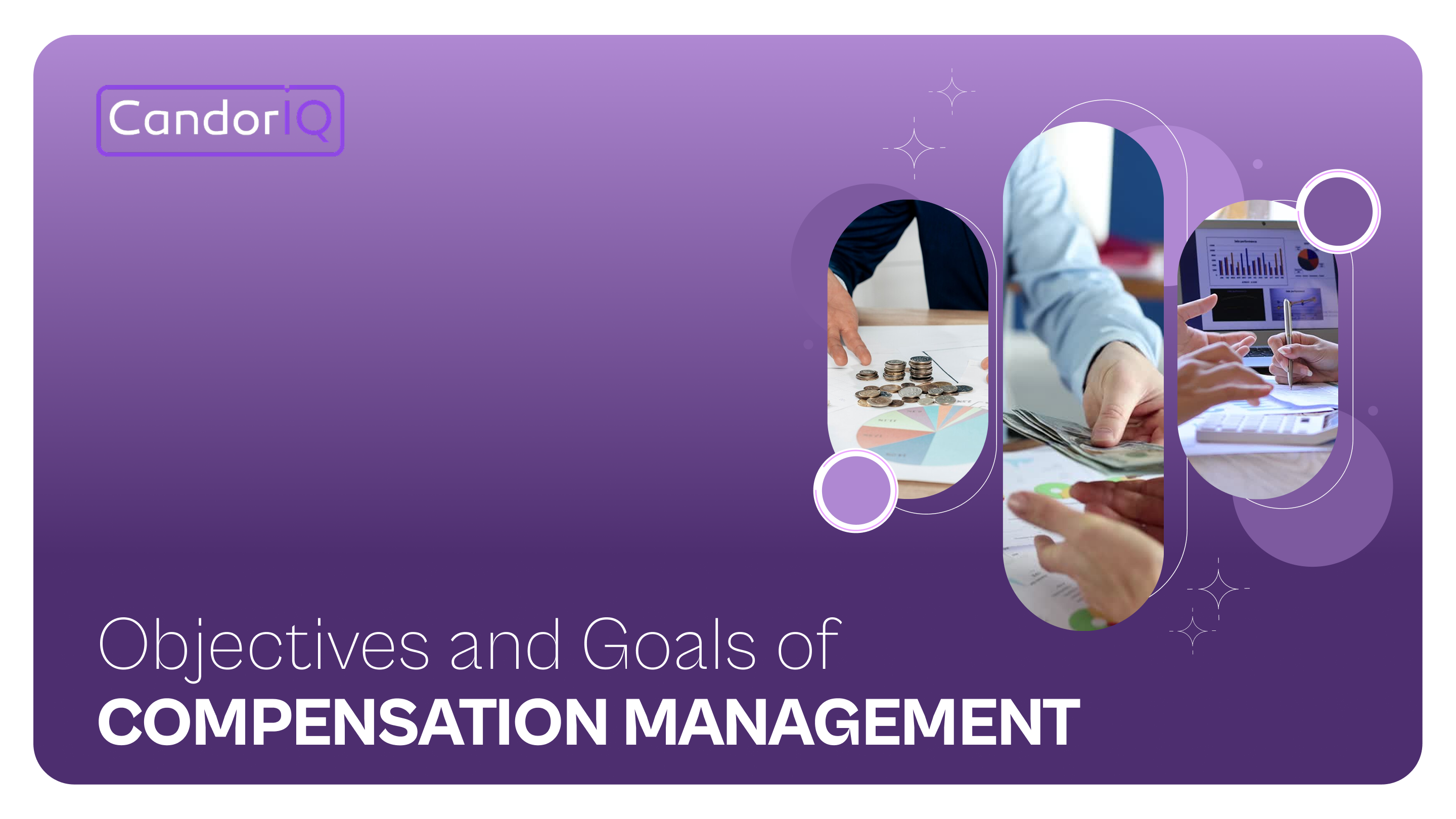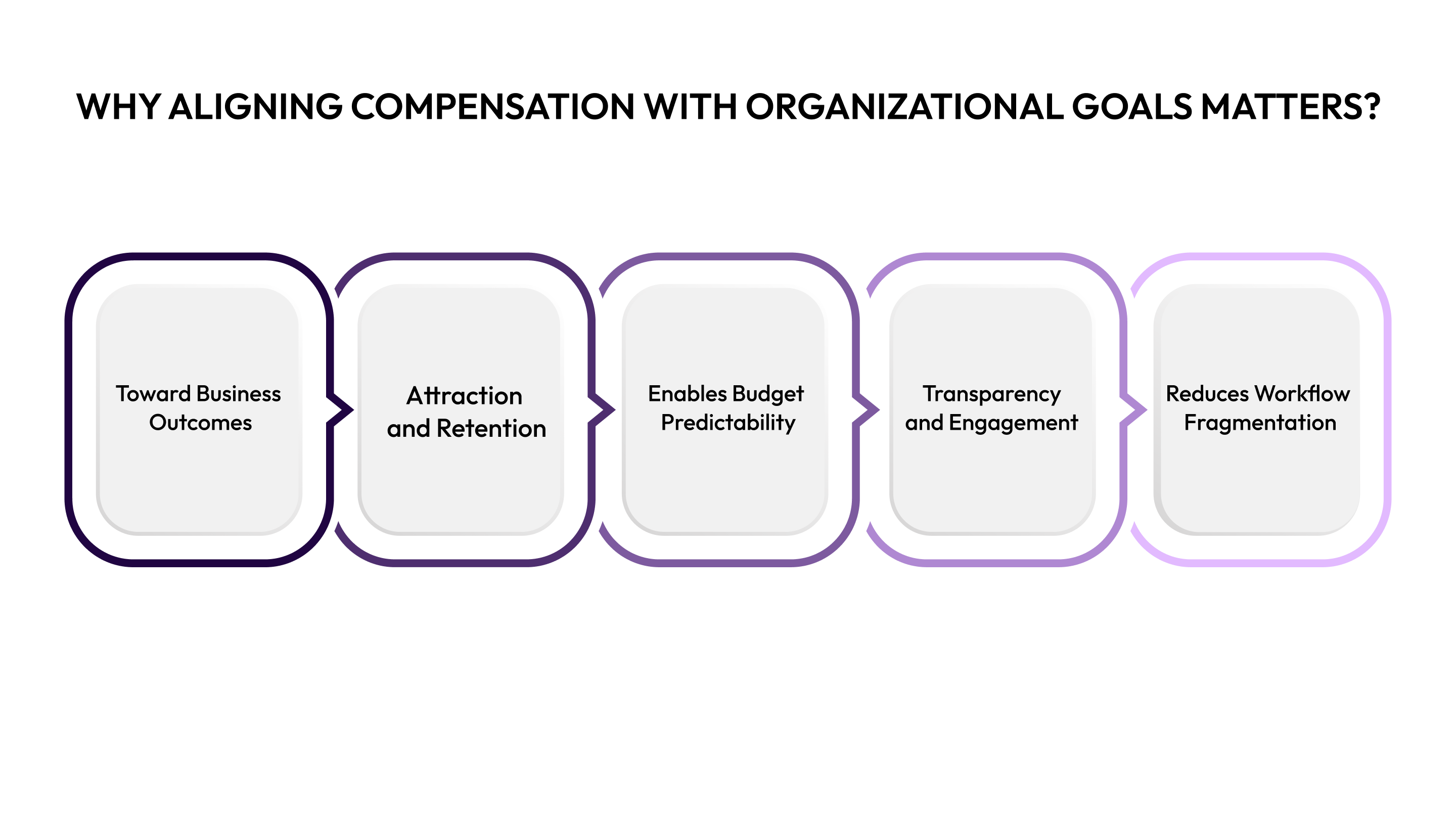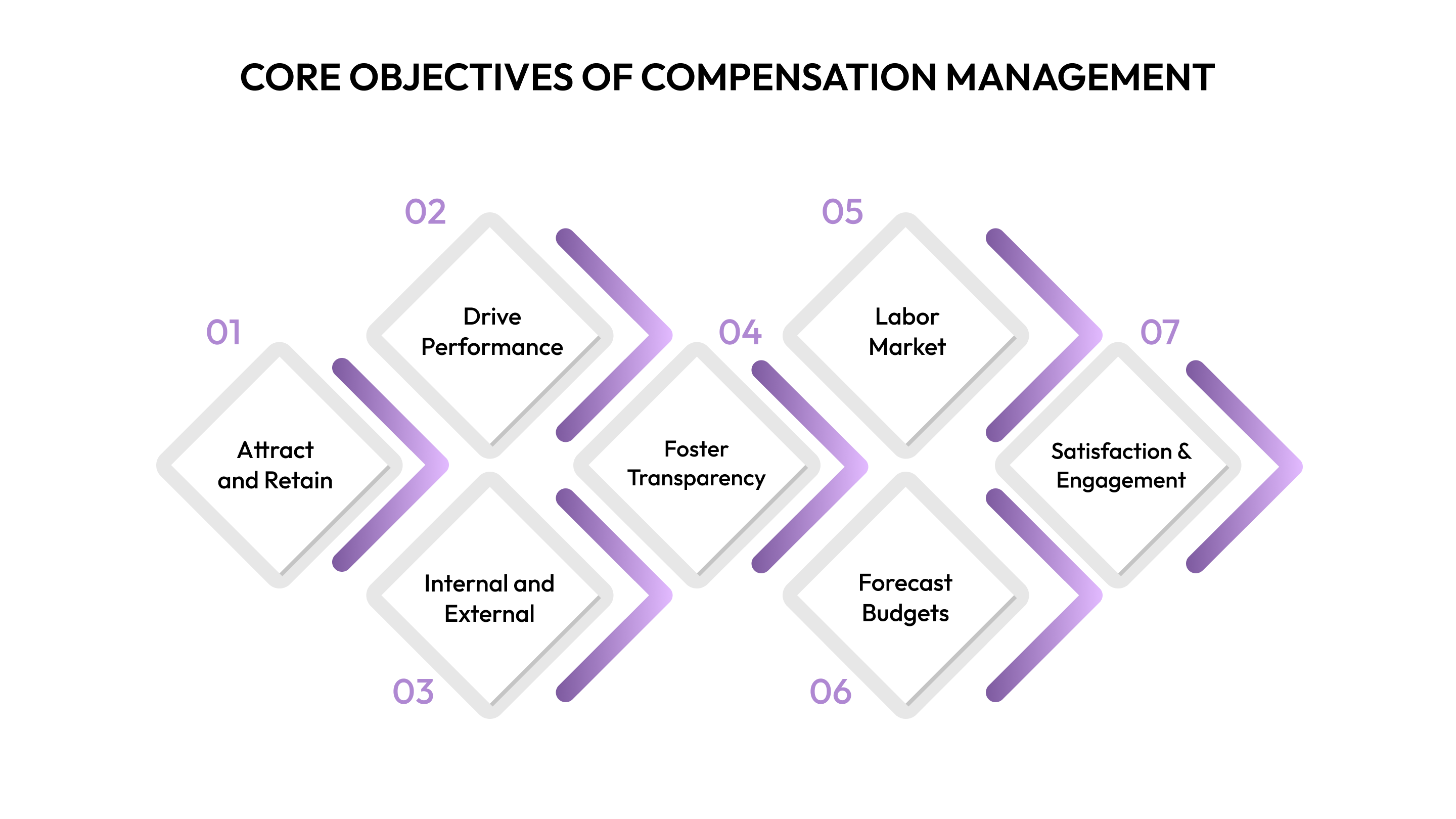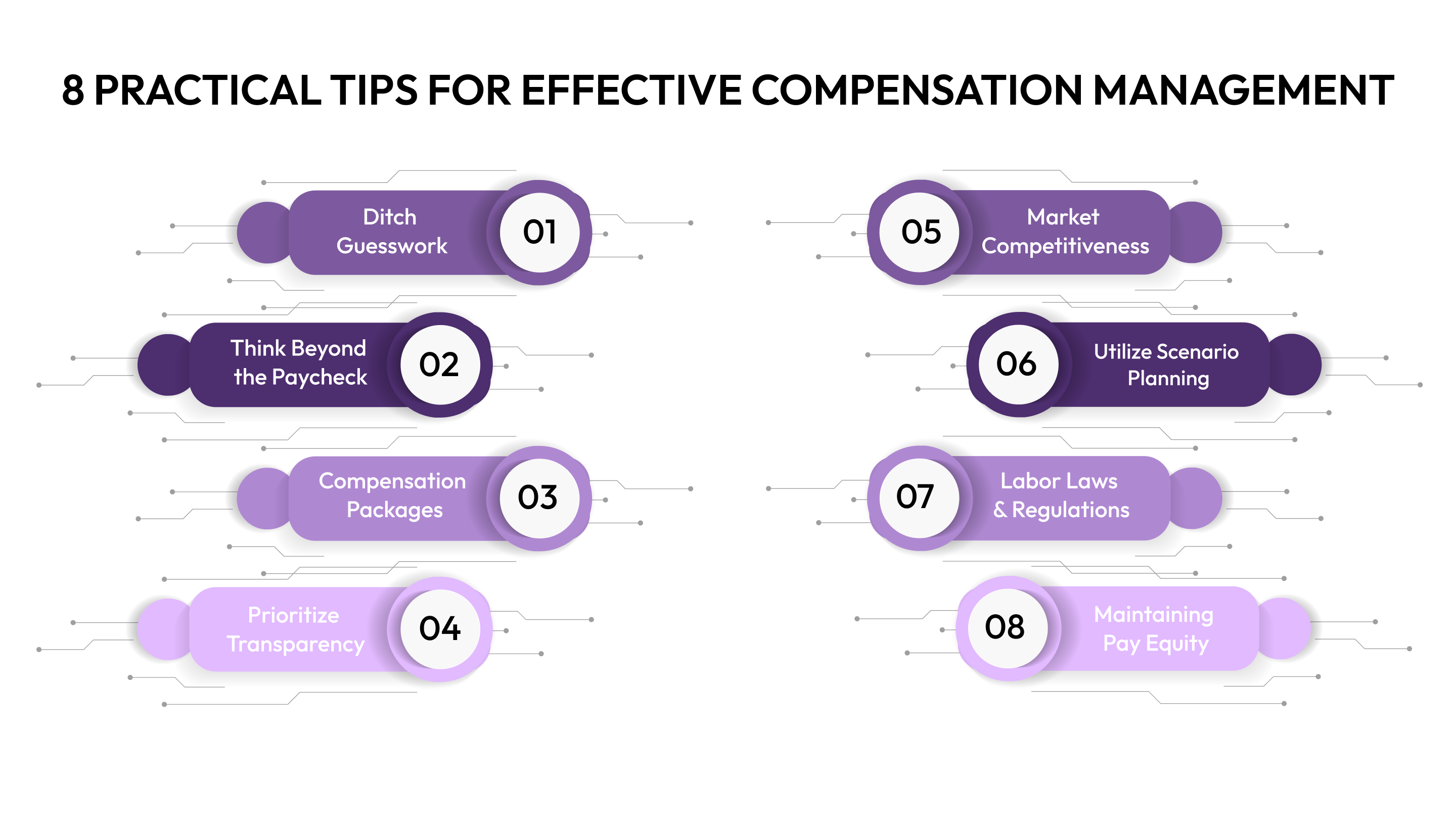Objectives and Goals of Compensation Management
Discover the aims of compensation management, attract talent with competitive pay, ensure legal compliance, and enhance job satisfaction. Click to learn more!

Compensation management is a key part of any successful HR strategy. It’s not just about paying salaries; it’s about creating a motivated, engaged, and high-performing team by offering fair and thoughtful pay. 73% of employees would consider leaving for a higher paycheck.
On top of that, nearly half of salaried workers didn’t get a salary increase in 2023, which is causing dissatisfaction. This highlights just how essential it is for businesses to invest in fair, transparent compensation systems that keep employees happy and help the company succeed.
In this blog, we’ll cover the key goals of compensation and how you can plan your compensation management strategy to boost business growth.
At a glance:
- Aligning compensation with organizational goals powers growth, talent retention, and budget control.
- Effective compensation management balances base pay, equity, bonuses, benefits, and transparency to boost employee satisfaction.
- Fast-growing companies face challenges like complexity, budget pressure, and pay equity—but smart technology and data solve these hurdles.
- Practical tips include using data-driven insights, building flexibility, maintaining transparency, and planning for future growth.
Why Aligning Compensation with Organizational Goals Matters?

When it comes to scaling a mid-sized company, especially one that’s moving fast, juggling a global team, and running lean HR and finance ops, lining up compensation with business goals is a smart decision.
Here’s why companies like SaaS startups, fintech disruptors, and remote-first e-commerce teams are putting this at the top of their to-do lists:
- Drives Performance Toward Business Outcomes: When pay is connected to business goals, teams know exactly where to prioritize their effort. It’s a lot easier for everyone to rally around the right targets and hit them sooner.
- Improves Talent Attraction and Retention: Consistent compensation strategies, built around your organization’s mission and values, help attract top talent and keep them longer. In fact, companies with strategic compensation plans see up to 22.2% less turnover.
- Enables Budget Predictability and Smarter Growth: Tying compensation to clear outcomes gives CFOs and FP&A leaders the real-time visibility they need for better forecasts and more confident hiring, even when headcount is doubling or tripling. Modern compensation platforms like CandorIQ provide the scenario modeling capabilities that help finance teams avoid nasty budget surprises as your team grows.
- Fosters Equity, Transparency, and Engagement: Aligned, transparent compensation strengthens pay equity and makes performance reviews more meaningful. In distributed, diverse teams, this is crucial for culture and engagement, not just compliance.
- Streamlines Processes, Reduces Workflow Fragmentation: A unified, strategy-driven approach streamlines messy, fragmented workflows. HR, finance, and recruiting managers can finally get back the time (and sanity) they’ve been losing to manual comp cycles and disconnected systems.
However, when building a pay strategy that actually supports your goals, it helps to know exactly what goes into those compensation packages. Understanding every component means you can plan better, close candidates faster, and keep teams motivated at every stage of growth.
Also Read: Choosing the Right Compensation Management Software for Your Organization
Breaking Down What Makes Up a Great Compensation Package
Compensation is a mix of different parts that work together to keep your team engaged and motivated. Let’s break down the key pieces:
1. Base Salary and Equity: Both Matter
Base salary is the steady paycheck that covers day-to-day life. It gives your team financial security and shows you value their skills.
Equity, like stock options or shares, is about the long game. It turns employees into owners, making them feel invested in the company’s future. That “ownership feeling” encourages people to stick around and give their best.
Many people will even accept a bit less salary if they get equity with growth potential. So it’s not “salary or equity,” but both playing their part.
2. Bonuses, Benefits, and Perks Matter Too
Bonuses reward hitting goals and keep motivation high. Benefits and perks, like flexible hours, wellness programs, or learning budgets, show you care about your team as people, not just workers.
These extras help attract top talent and keep your team happy longer.
3. The Big Picture: A Holistic Approach Works Best
It’s not just salary or perks alone. A winning compensation strategy blends pay, bonuses, benefits, and work-life balance offers into one package.
When employees feel valued in all these ways, they stay engaged, loyal, and ready to grow with your company.
Now that we know what goes into a solid compensation package, let’s talk about the objectives of compensation management.
Core Objectives of Compensation Management

Compensation management isn’t just about handing out paychecks. It’s about creating a system that drives business success, keeps employees motivated, and ensures fairness across the board. When done right, it powers everything from attracting the best talent to managing budgets with confidence.
Here’s what those core goals look like up close:
- Attract and Retain the Right Talent: It’s no secret that competitive pay and benefits pull top performers in and keep them around. Compensation management makes sure your offers hit the mark so you don’t lose your stars to the competition.
- Drive Performance and Productivity: Linking pay to results means people know what they’re aiming for. Bonuses, incentives, and equity rewards push your team to focus on what moves the needle and helps the company grow.
- Maintain Internal and External Equity: Fair pay matters. It builds trust inside your organization, supports diversity, equity, inclusion, and belonging (DEIB) goals, and keeps your brand strong in the talent market. No one wants to feel undervalued, and compensation management helps prevent that.
- Foster Transparency Between Management and Teams: Open, clear communication about how compensation decisions are made creates trust and alignment. When employees understand their pay and the rationale behind it, they feel more engaged and connected to company goals.
- Stand Out in the Labor Market: In a crowded talent marketplace, having a clear, fair, and competitive compensation strategy sets you apart. It shows candidates and employees that you’re serious about rewarding people fairly and investing in their growth.
- Control Costs and Forecast Budgets: Especially for fast-growing companies, keeping a close eye on salary budgets and headcount costs is mission-critical. Good compensation management gives finance teams the data and tools they need to plan smartly and avoid surprises.
- Support Employee Satisfaction and Engagement: Pay is more than just money; it’s a part of how employees feel about their work and their company. Clear, transparent, and well-structured compensation helps boost morale and loyalty.
When compensation management checks all these boxes, it becomes a strategic powerhouse, not just an HR process. This is why every HR leader, CFO, and people manager should see compensation management as a vital tool for steering their company’s future.
While the goals of compensation management are clear and impactful, getting there isn’t always a smooth ride. You can face a set of challenges that can trip you up if you’re not ready.
Also Read: Effective Compensation Benchmarking for HR Teams in 2025
What’s Holding Back Your Compensation Strategy
Even with clear objectives and the best intentions, compensation management can be tricky. Growing companies, especially those scaling fast with lean teams, face real hurdles that can slow down progress or create friction.
Let’s break down the biggest roadblocks you can typically run into.
- Handling Growing Complexity Without Getting Overwhelmed: Compensation strategies are getting smarter and cover more roles, locations, and pay types every day. Managing all that manually or with old tools just can’t keep up. Many teams still struggle with spreadsheets, which leads to errors, frustrated employees, and wasted hours resolving issues instead of planning.
- Balancing Budgets While Staying Competitive: Keeping compensation within tight budgets while offering competitive pay is like juggling flaming torches. Managers ask for raises or bonuses without knowing budget limits or market rates, which causes unrealistic expectations, last-minute chaos, and can even hurt trust when leadership has to say “no.”
- Building Trust Through Pay Transparency: These buzzwords carry real weight today. Employees want to know how pay is decided and want fairness in pay. But with changing laws and close scrutiny on equity, balancing transparency without causing friction is tricky.
- Avoiding Spreadsheet Nightmares and Disconnected Systems: Manual processes and scattered systems also cause headaches. When HR, finance, and managers don’t share compensation data or have a unified system, mistakes and delays happen. This problem grows even worse with distributed or remote teams.
- Empowering Managers with the Right Compensation Data: Managers need to feel informed and empowered. They want to reward good work but often have no access to real data like salary bands, performance scores, or market benchmarks. This “blind” decision-making leads to inconsistent pay and frustration across the board.
The good news? These challenges aren’t impossible to fix. With smarter tech, better data, and clearer processes, you can turn compensation management into a real competitive edge.
8 Practical Tips for Effective Compensation Management

As a CPO or CFO at a fast-growing company, you're tasked with attracting top talent and keeping your current team happy, all while staying on budget. With a lean HR team, this balancing act is tough.
Here are some actionable tips to build a scalable and fair compensation strategy.
Tip 1: Ditch Guesswork, Use Data
Stop relying on spreadsheets and old surveys. For your company to scale fast, you need a data-driven approach.
Actionable Tip: Invest in a platform that provides real-time market data for your industry (SaaS, fintech, etc.). Use this data to create clear compensation bands for every role. This makes pay decisions consistent and objective, preventing that dreaded pay compression.
Tip 2: Think Beyond the Paycheck, Build a Total Rewards Philosophy
Salary is just one part of the equation. Your total rewards package is what sets you apart in a competitive market.
Actionable Tip: Define a clear philosophy that combines base salary with variable pay, bonuses, and equity. For a growth-stage company, equity is a powerful tool. It aligns employee success with company growth. For sales teams, tie their commission structure directly to business outcomes to help your FP&A team forecast expenses more predictably.
Tip 3: Build Flexibility into Your Compensation Packages
A one-size-fits-all approach doesn't work for a globally distributed team.
Actionable Tip: Provide a core benefits package, but also offer flexible stipends for things like remote work, wellness, or professional development. This small amount of flexibility can make a big difference, showing you understand your employees' diverse needs and making your offer more attractive.
Tip 4: Prioritize Transparency and Communication
Lack of transparency breeds mistrust.
Actionable Tip: Lead the charge on this. Clearly communicate how compensation is set and how performance impacts pay. Provide recruiters with tools that visualize the full value of an offer, including equity and bonuses, and show how it stacks up against the market. This transparency helps you close candidates faster and builds trust from day one.
Tip 5: Regularly Review Compensation for Market Competitiveness
When you're scaling 2-3x a year, the market moves fast. What was competitive six months ago might not be today.
Actionable Tip: Set a schedule for semi-annual compensation reviews. Use software to flag roles that are falling behind the market. This proactive approach prevents you from losing top talent and gives your CFO a more predictable view of future payroll costs.
Tip 6: Utilize Scenario Planning for Future Growth
Your CFO needs to plan, not just react. Without the right tools, it's impossible to see the real impact of your hiring plan on the budget.
Actionable Tip: Use compensation planning software to run different scenarios. What if you gave a 10% merit increase? What if you hired 50 new people in different regions? Having these answers on demand allows you to be a strategic partner to the business. Platforms like CandorIQ make this kind of scenario modeling straightforward, giving you the ability to test different growth strategies before committing budget.
Tip 7: Compliance with International Labor Laws and Regulations
With a remote-first team, you're operating under many different sets of rules.
Actionable Tip: Get a handle on the labor laws in every state and country where you have employees. This includes minimum wage, overtime, and leave policies. A single misstep can lead to costly legal issues.
Tip 8: Maintaining Pay Equity Across Regions
Deciding how to handle pay differences based on location is tricky.
Actionable Tip: Establish a clear and consistent geographic pay strategy. Will you pay a premium for high-cost-of-living areas, or use a single national pay scale? Whatever you decide, be consistent and transparent. This maintains a sense of fairness and prevents employees from feeling shortchanged based on their location.
Read More: How to Develop a Comprehensive Compensation Strategy: Practical Guide
Final Thoughts!
The shift from reactive to strategic compensation management doesn't happen overnight, but it's one of the most impactful investments you can make in your company's growth. Whether you're managing a team of 50 or scaling to 5000, having the right foundation in place makes all the difference.
The key is to choose solutions that grow with you. This is where CandorIQ shines. Our platform helps fast-growing companies streamline their compensation processes end-to-end, from designing competitive pay packages, tracking equity, ensuring compliance, to forecasting budget impacts, all in one place.
With CandorIQ, your HR, finance, and leadership teams stay aligned, informed, and prepared to make informed decisions that drive growth.
Ready to see the difference modern compensation management can make? Book your demo and discover how you can scale your compensation strategies without the spreadsheet chaos.
FAQs
1. How does compensation management contribute to employee engagement beyond salary?
Compensation management goes beyond salary by incorporating benefits, recognition programs, and performance-based rewards. These components can significantly boost employee engagement, creating a sense of appreciation, motivation, and alignment with organizational goals.
2. What role does compensation management play in shaping company culture?
A well-structured compensation system can reinforce a company's values and culture. By aligning pay with desired behaviors, such as collaboration or innovation, companies ensure that their compensation strategy not only attracts top talent but also encourages the right mindset among employees.
3. Can compensation management influence long-term retention strategies?
Yes, compensation management directly affects retention. Competitive and transparent compensation practices, including long-term incentives like stock options or retirement plans, foster loyalty by giving employees a financial reason to stay long-term while helping them plan for their future.
5. Is it possible for a company to have fair compensation but still fail at employee satisfaction?
Yes, compensation is only one part of the employee experience. A company might offer competitive pay but still struggle with employee satisfaction if it doesn't address factors like career growth, work-life balance, leadership support, and job meaningfulness, which also significantly contribute to overall job satisfaction.
Ready modernize your workforce and compensation strategy?
See how CandorIQ brings workforce planning and compensation together with AI.


